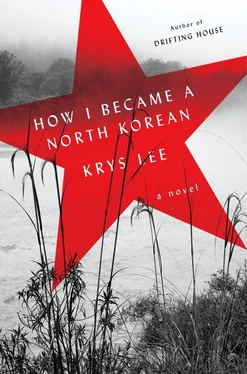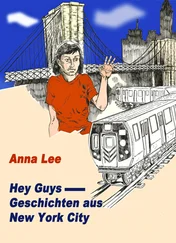“She’s bad news,” Daehan pronounced in my ear, his voice full of worry. “You shouldn’t get involved in her affairs.”
While the boys complained, Missionary Lee spread his arms like an eagle and gave her an awkward hug, surrounding her small frame. She shuddered and pressed back into the bookcase so hard that its skeleton must have imprinted itself on her back. No corner seemed deep enough for her.
“I’m so sorry,” Missionary Lee stammered, and he clumsily dusted off her shoulders, her stomach, as if trying to brush away his fingerprints. She let out a small, raking scream at his touch, and I could only guess what must have happened to her.
Missionary Lee said, “Is there something you want, my child? Is there anything I can do for you at all? Maybe some food?” His voice squeaked with alarm.
She looked away. “I want to be without this body. I want to be air. Can you make that happen?”
Missionary Kwon thumped the wall and addressed the boys. “I demand obedience. Who runs this house? Who gives the orders here? She is staying because I said she’s staying.”
I promised to watch over her, and Missionary Kwon knew I kept my word. My words — I was embarrassed for those helpless, fluttering birds as adrift as I was.
Once Missionary Kwon left, the others bowed together in a conspiratorial circle, touching.
• • •
After Jangmi had fled our mountain dugout, questions made fierce revolutions in my head. Now more questions. What had happened to her? Did I really care about her, about anyone, or were my expressions of interest merely a way of escaping myself? One thing was certain: No doctor could repair what was broken inside Jangmi.
All afternoon, while she rested, I glued and painted the wood crosses that Missionary Kwon had us make for churches located overseas. I worked slowly, deliberately. There were so many fraught elements involved, and my own considerations daunted me. I saw walls that I shouldn’t broach: a nuna four years my senior who was once with child, my desire in search of an object.
“She’s dangerous,” said Daehan, his words as wild as weeds. “Someone who’s stolen and betrayed us will do it again.”
He wasn’t wrong. But she had done it for her child. I said like a fool, “I can be betrayed again.”
“Sympathy is healthy. Sympathy I get.” His eyes darkened. “But someone like her couldn’t possibly be interesting to you.”
He meant an uneducated, provincial woman, an ajumma knowledgeable in the womanly ways, all stories I had already told myself.
His words provoked me. I chopped fresh ginger the way my eomeoni had once done for me and made her tea. As I walked to Jangmi’s room, a mighty hand seemed to seize a gun’s barrel and aim it at my chest. I saw the red leather jacket. The women I loved, their feet knocked against the ground like hollowed-out gourds as they were dragged away. I halted at the door’s threshold, memories lodged in my throat like a curved fish bone.
July had turned the building into a greenhouse of trapped stale air, but Jangmi was balled up under a blanket, her arms shielding her head. As if I even knew how to be dangerous.
As soon as I set the tray beside her, she flung the blanket away. The room tipped for me as her eyes touched mine. The melancholy of her eyes. They felt like home. She didn’t belong to the acidic stink of waste and urine seeping out of the bathroom and the brassy smell of our bodies in the boarded-up heat that made you gag if you breathed too deeply. The sole of her foot was as tough as animal hide, but her toes were somehow still perfectly formed, like cultured pearls. It moved me, her rough elegance.
“What do you want? I don’t have anything to give you and you don’t have anything I need.”
She was so direct, so different from Myeonghui, who already felt like another life.
“Why do you think I want something?”
“Everyone wants something from each other.”
She wasn’t wrong, but I said, “I want to stay right here.”
“Why?” She shook her head. “I’m capable of much, much worse.”
She grabbed my knee, digging in. “Tell me, dongmu, what would you do to get out of this country? Would you kill, if you had to?”
She raised those words to her lips so easily.
I thought about the Dear Leader, the man in the red leather jacket. “Not everyone deserves to live.”
“No, maybe they don’t.”
I said, “You, dongmu, would you?”
She told me to sit beside her, so I did. I would have done anything she told me to. My fingers tingled when she took my hands in hers.
“You have such pretty hands.” Her smile was turbulent. “I’ve never seen such beautiful hands. Maybe hands like yours aren’t made for killing.”
I thought about my eomeoni, pushed into a van. My sister, how they had lifted her up when she wouldn’t quiet down and dropped her into the van like a chopped-down tree. How I couldn’t do anything for them.
“You can do anything.” I gazed at her. “You’re stronger than I am.”
• • •
It was Daehan who told me we were organisms of infinite hunger, born hungry infants before we are able to form permanent memories. There were as many different kinds of hunger as there were people. Change and stillness, love and solitude, freedom and tyranny, all of them to me were synonyms for hunger. To be beyond hunger, I thought, must be a place beyond desire.
A colony of parasites nested inside Jangmi. She ate bowls of rice, soybean-paste stew, spicy pork when it was available, as if eating would stave off thinking. I began giving her half my portion; she reminded me of what it meant to be hungry.
On the fourth day I set the dinner tray beside her and lit her a candle, as had become my routine. She eyed me, a potential predator. “You’re wasting your time being nice. You’re not getting anything from me.”
“It’s for myself,” I said. She looked as if nothing I said could make her believe me.
Her hands clutched at the blanket and the veins rose on the backs of her hands. “I don’t need friends. I’ve always taken care of myself.”
“Think of me as a dongsaeng, not as a man. I can be a little brother. I can be anyone now.”
“ Dongsaeng? ” She shrugged. “It’s been a long time since I’ve had anything like a dongsaeng .”
We couldn’t eat ice cream or thrill ourselves with amusement park rides, try foreign foods like hamburgers and pretend to enjoy them, or walk by the river the way I had with Myeonghui. We couldn’t do anything. But we were usually together.
She told me about her few happy childhood moments, how she wished she’d been born a man because men lived free from fear. I painted a village for her on the wall, the sky a cerulean blue, a sun glowing with heat and light. When she limped out on her walking stick for the first time, hope grew in me. But after one look at Cheolmin’s and Bakjun’s prowling eyes, at Daehan’s stormy eyebrows, she rushed back into her concrete box.
I ate quickly and went to her with a tray.
“There wasn’t enough room at the saang, ” she said.
While she ate, I tried to read the Bible. The words of Daniel walked in front of me. One tiny black leg of each letter ahead of the next, then the next. The  wiggled ahead of the
wiggled ahead of the  . The
. The  slowly clambered over the
slowly clambered over the  . When I woke up, there was a pillow under my head — Jangmi’s.
. When I woke up, there was a pillow under my head — Jangmi’s.
Читать дальше

 wiggled ahead of the
wiggled ahead of the  . The
. The  slowly clambered over the
slowly clambered over the  . When I woke up, there was a pillow under my head — Jangmi’s.
. When I woke up, there was a pillow under my head — Jangmi’s.










